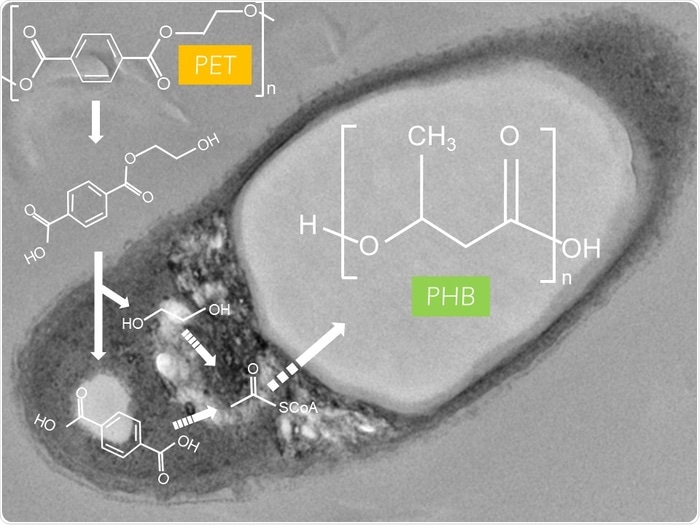Plastic pollution is an evident environmental issue at present. The aggregation of petroleum-based plastics poses disastrous effects on wildlife, human health, and the environment.

Ideonella sakaiensis grown on poly(ethylene terephthalate) (PET) accumulates poly(3-hydroxybutyrate) (PHB). Image Credit: Shosuke Yoshida.
Scientists from the Nara Institute of Science and Technology showed that a bacterium capable of degrading hard-to-recycle petroleum-based plastics can also sustainably produce more eco-friendly biodegradable plastics.
The research was published in the Scientific Reports journal.
Petroleum-based plastics, including poly(ethylene terephthalate) (PET), are widely employed in day-to-day products, like textiles, single-use plastic bottles, and food wrappers. Even though these products are discarded quickly after use, they thrive in the environment for numerous years.
The plastic pollution resulting from the throw-away culture has now surpassed manageable levels and is overpowering the planet’s capability to deal with it. The environmental effects are now becoming highly obvious, with wildlife and human health threatened increasingly.
Decreasing the manufacture of unwanted single-use plastics and enhancing waste management systems will help alleviate the pollution problem. The dependence on the convenience of plastic products is unlikely to decrease any time soon.
Hence scientists are on the lookout for other approaches to “clean up” the more persistent plastics from the environment. Microorganisms may provide promising solutions in this aspect.
Certain bacteria harbor the necessary enzymes to degrade PET, the most problematic plastic environmentally. Our research has shown that the bacterium Ideonella sakaiensis converts PET into poly(3-hydroxybutyrate) (PHB), a type of poly(hydroxyalkanoate) (PHA) plastic that is biodegradable.”
Shosuke Yoshida, Study Senior Author, Nara Institute of Science and Technology
The recent observation is providing hope as it is applicable to two persisting issues for plastic sustainability: degrading the most persistent form of petroleum-based plastic and at the same time developing biodegradable plastics sustainably.
We believe that this discovery could be significant in tackling plastic pollution. As we show that the PET-degradation and PHB-synthesis pathways are functionally linked in I. sakaiensis. This might provide a novel pathway where a single bacterial species breaks down difficult-to-recycle PET plastics and uses the products to make biodegradable PHA plastics.”
Shosuke Yoshida, Study Senior Author, Nara Institute of Science and Technology
Provided the astonishing challenge of dealing with global plastic pollution, this new bacterial approach might be a vital part of the solution.
Source:
Journal reference:
Fujiwara, R., et al. (2021) Direct fermentative conversion of poly(ethylene terephthalate) into poly(hydroxyalkanoate) by Ideonella sakaiensis. Scientific Reports. doi.org/10.1038/s41598-021-99528-x.